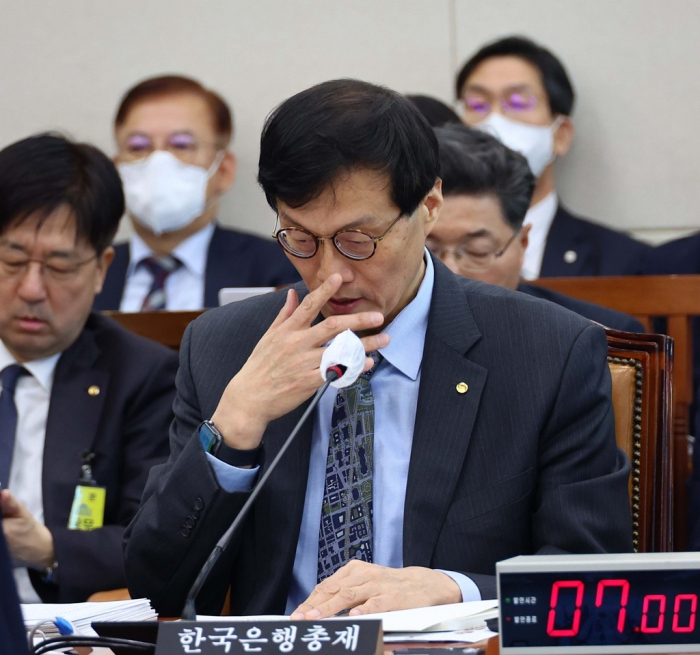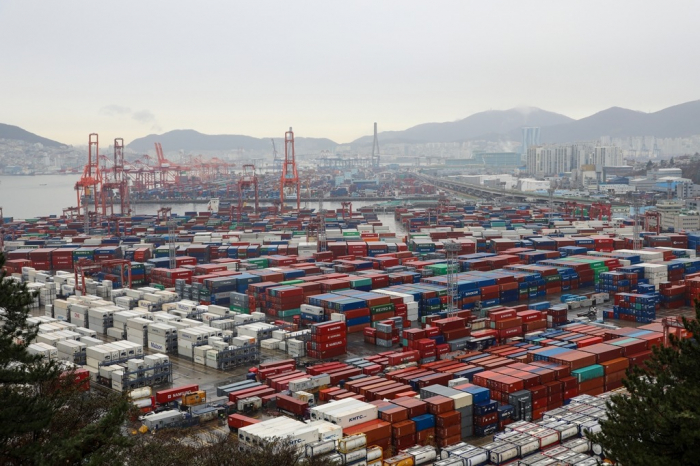Central bank
BOK sees interest rate as tight amid continued drop in exports
Korean semiconductor exports tumble 44% Feb. 1-20, sales to China fall 23%; BOK expects weak benefits from China’s reopening
By Feb 21, 2023 (Gmt+09:00)
3
Min read
Most Read
LG Chem to sell water filter business to Glenwood PE for $692 million


Kyobo Life poised to buy Japan’s SBI Group-owned savings bank


KT&G eyes overseas M&A after rejecting activist fund's offer


StockX in merger talks with Naver’s online reseller Kream


Mirae Asset to be named Korea Post’s core real estate fund operator



South Korea’s central bank said on Tuesday it regards the current interest rate as tight, suggesting the monetary authority may hold the policy rate unchanged this week, as a sustained fall in exports reinforced concerns over a recession in Asia’s fourth-largest economy despite sustained inflationary pressure.
The Bank of Korea said the trade-dependent economy is expected to slow from 2022, given sluggish exports and a tepid recovery in consumption, although growth is expected to improve in the second half thanks to a revival in the Chinese economy and information technology sectors.
“(The BOK) has raised the base interest rate to a tightening level in a bid to curb the spread of inflation expectations and prevent high inflation from becoming permanent,” said the central bank in a report to lawmakers. The BOK has ramped up the policy rate by 3 percentage points to 3.5% through 10 hikes since August 2021.
“We plan to decide on the necessity of additional interest rate hikes, considering the impact of rate increases so far, the speed of slowing inflation, as well as downside risks to growth and financial stability,” said the BOK, although the central bank said it needs to maintain the tight monetary policy for price stability.
BOK Governor Rhee Chang-yong said the monetary authority believed the base interest rate has reached the upper side of neutral or topped the rate at which monetary policy is neither stimulating nor restricting economic growth, when the central bank raised the policy rate to 3.25% in November 2022.
The remarks came ahead of its monetary policy meeting on Thursday when the central bank is widely expected to keep the interest rate unchanged.
EXPORTS CONTINUE DECLINE
Exports slid 2.3% to $33.5 billion in the first 20 days of the month from a year earlier, separate data from the customs agency showed earlier in the day. Overseas sales dropped 16.6% in January, extending its falling streak to the fourth month in a row.
On the other hand, imports grew 9.3% to $39.5 billion during the Feb. 1-20 period, generating a trade deficit of $6 billion. That increased the total trade shortfall to $18.6 billion so far this year, almost 40% the record deficit of a revised $47.5 billion in 2022.
Overseas sales of semiconductors tumbled 43.9%, indicating South Korea’s top export item kept suffering weakening demand due to a global economic slowdown. The country is home to the world’s two largest memory chipmakers – Samsung Electronics Co. and SK Hynix Inc.
Exports of mobile communication devices also skidded by 25% although Samsung is also the world’s No. 1 smartphone maker.

DON'T PIN TOO MANY HOPES ON CHINA’S REOPENING
Sales to China, the country’s largest overseas market, slumped 22.7% despite the country’s economic reopening.
The BOK expected sales of IT products such as semiconductors and mobile phones to the world’s second-largest economy to gradually recover after an improvement in exports of domestic demand-related items such as chemicals as China focuses on a consumption revival.
The central bank said benefits from the end of China’s zero-COVID policy may be weaker than initially expected.
“As China’s economy is predicted to recover led by consumption, the impact on (South Korea’s) economic growth is likely to fall short of the effect in the past when investments boosted the Chinese economy,” the BOK said.
The monetary authority saw risks of increasing inflationary pressure in South Korea from China as growing demand on the mainland could result in higher prices of crude oil and other commodities.
Write to Mi-Hyun Jo, Byung-Uk Do and So-Hyeon Kim at mwise@hankyung.com
Jongwoo Cheon edited this article.
More to Read
-
 EconomyTreasury yield falls signal BOK's looser grip on inflation
EconomyTreasury yield falls signal BOK's looser grip on inflationFeb 13, 2023 (Gmt+09:00)
3 Min read -
 EconomyS.Korea’s trade outlook dismal in Feb with stagnant exports
EconomyS.Korea’s trade outlook dismal in Feb with stagnant exportsFeb 13, 2023 (Gmt+09:00)
2 Min read -
 EconomyS.Korea likely to suffer recession as Jan exports tumble
EconomyS.Korea likely to suffer recession as Jan exports tumbleFeb 01, 2023 (Gmt+09:00)
3 Min read -

-

-
 Central bankBOK takes 25-bp rate hike as won rebounds against dollar
Central bankBOK takes 25-bp rate hike as won rebounds against dollarNov 24, 2022 (Gmt+09:00)
2 Min read
Comment 0
LOG IN


